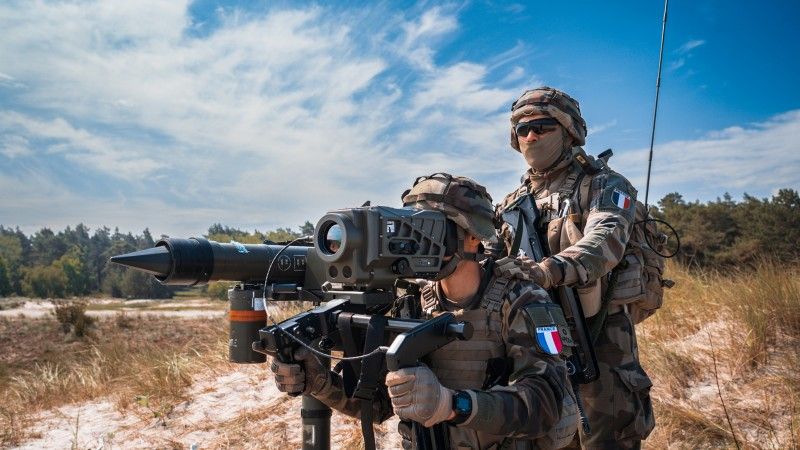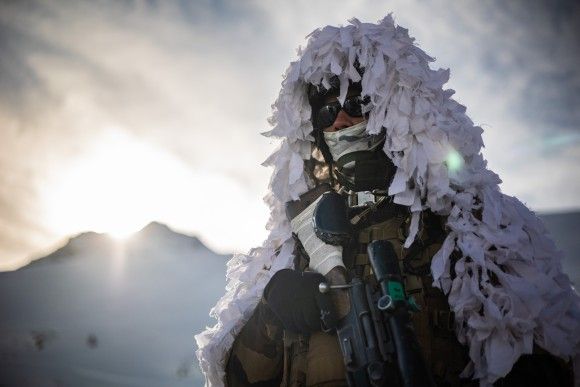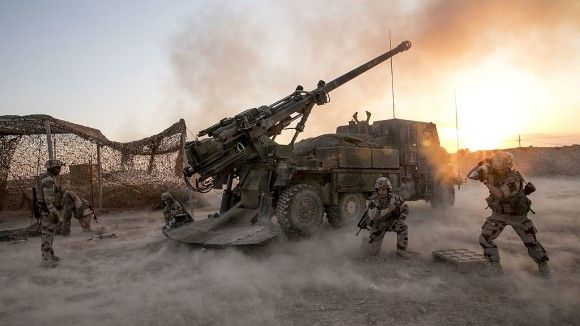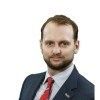Defence Policy
Europe needs the ambition to strengthen military cooperation

Europe is discussing the approach to community action in defense, which is a natural derivative of the war in Ukraine. Defence24 interviewed Dr. Pierre Haroche, an expert from the French Institute for Strategic Research (IRSEM) based in Paris, to show different perspectives on this dialogue. The topic of the discussion, conducted by Dr. Jacek Raubo, was the issue of cooperation between European countries in the field of defense policy, with particular emphasis on the defense industries, the possibility of communitarising some of the purchases of equipment, and the challenges posed by European relations in the field of strengthening security and defense.
In an interview with Jack Raubo, French expert Dr. Pierre Haroche primarily notes the current role and importance of the so-called "Versailles Agenda." The European Commission was asked to increase the importance of joint purchases and coordination of military investments. In his opinion, this kind of behavior of European leaders is strictly determined by the reaction of EU countries to the war in Ukraine. At the same time, we cannot forget about many years of work on the so-called strategic compass of the EU, which also determines the new possibilities of the community in the face of the current international situation.
The key to changes in European defense is strengthening the importance of joint European arms purchases. According to Dr. Pierre Haroche, we must remember the European Defense Fund (EDF) development, which is a derivative of the events that took place in 2014-15 also in Ukraine. After all, as early as 2015, EU representatives said that we must have our defense resources to show Russia that we are serious about our security. This was the tone of the former President of the European Commission, Jean-Claude Juncker. However, according to the French expert, the European Defense Fund is a tool tailored to peacetime. Because its goal is primarily to invest in research and development (R&D) and thus acquire prototypes for future systems, it works even from a medium-term perspective. But such an approach may be irrelevant to the present reality. Dr. Pierre Haroche emphasizes that, in his opinion, we are in a "time of war." Therefore, a specific timing should be completely different today, in the first place, in the case of military needs.

Nowadays, according to the IRSEM expert, there is a very interesting opportunity to discuss the subsidy from the Community budget for joint purchases in the defense space. This would show that the EU is taking a step forward, as it invests in research and development and also focuses on acquiring military assets. Already now necessary to increase the effectiveness of activities in the area of security and defense. In general, according to Dr. Pierre Haroche, it is also essential not only to invest additional sums from community solutions but also to coordinate armaments, in a way, using the EU level. Let us note that there is a belief among the majority of European countries that defense budgets should be increased due to the same threat. We all want to increase the armed forces' readiness and improve deterrence in the face of Russian actions in Europe. This is, of course, a positive signal, according to the expert. But in his opinion, it also carries with it risks.
There is a possibility that some competition will emerge. Compare this to the recent "fight" for vaccines against the SARS-CoV-2 virus, which representatives of the European Commission are to pay attention to. Figuratively speaking, when everyone wants to buy at the same time, e.g., weapons, frustration may arise for those who cannot obtain the necessary things. Primarily when the companies focus on the most lucrative contracts or when they first execute orders from the most significant countries, which will buy more from others. Not to mention that prices can rise sharply with such demand in the market. Hence, the European leaders, especially with the support of the French presidency in the EU, stressed that it is crucial to create a framework for cooperation precisely in the situation on the market. This means focusing on - coordination, and therefore investing in jointly established priorities; community action, including undertaking purchases together; and action focused also on creating opportunities for European industry in the current situation, because this is the moment when we can strengthen the European arms industry and its foundations, and not only support entities from outside the EU with our purchases.
The European Commission has already proposed two steps in May, the first with a pilot program on the essential and urgent issues and the second with the European Investment Plan, potentially more ambitious and long-term. Dr. Pierre Haroche pointed out that France strongly supported such ideas, and even the French authorities lobbied for a more ambitious budget for cooperation in this area. Similarly, the Estonian authorities saw more ambitious goals in EU projects. Therefore, the IRSEM expert believes that we should continue to strive to increase funding for such projects on an EU scale and work towards a more ambitious cooperation agenda.
The argument in favor of joint purchases in the arms market and the use of new EU tools is that the political will of individual states may be there now but may well weaken in a moment. Examples of problems with the aforementioned political will can be seen in the programs developed under PESCO, where there is no strong emphasis on community action in key and most needed initiatives. Not to mention that bureaucracy can also reduce ambition when it comes to given projects, even if the political will itself is maintained. However, if the EU can put EU money on the table, the stability and reliability of long-term action will increase. Dr. Pierre Haroche believes that this is why there are so many hopes for the creation of the European Defense Fund, even with all its limitations. Hence, in his opinion, if we apply similar instruments to community purchases, our defense goals will have an excellent prognosis. Especially since the involvement of EU funds always gives the necessary credibility.

Activities in the field of Community acquisition of weapons and equipment are also, according to Dr. Pierre Haroche, an ideal solution for supporting EU-NATO relations. We are dealing with the possibility of strengthening the capabilities of individual countries in the field of armed forces, also in the context of their activity in NATO. Moreover, it is possible to focus on those segments of activities where the EU can better implement the programs concerned than that of NATO. The expert notes that we are talking primarily about the extensive EU budgetary tools, financial, and the EU policy covering industrial issues. NATO is, above all, a substantial actor in terms of the military, but not necessarily an actor with the advantages mentioned earlier in the EU context. We are still discussing the coherence between the activities of both structures, i.e., NATO and the EU.
Dr. Pierre Haroche notes that Community investment can produce a fascinating result. If we invest in a similar model among many armies, we will obtain better interoperability capabilities in terms of training, but also potential operation in crisis conditions. An example is the purchase of the same equipment for troops from France and Belgium, which translates all the time into the segment of training and developing the necessary doctrines for its use. Alternatively, we will also be able to talk about the emergence of something like a common tactical culture generated among European partners. In his opinion, it should also be remembered that community purchases guarantee an increase in the importance of smaller and medium-sized countries, which may not always be positioned in the priorities of large corporations if they try to buy some weapons on their own. However, if the equipment is purchased from a community standpoint or through consortia formed by groups of countries, there are more opportunities to talk to vital industrial actors.
In the interview, Dr. Pierre Haroche drew attention to security in the area of supply chains. Hence, in his opinion, it is important to see two aspects, i.e., the acquisition mentioned above of equipment from the EU level and the acquisition based on the European industry. Even in a crisis, we will have some form of greater control over the supply chain and the scale of supplying the armed forces with the necessary resources. External actors can always find themselves in a crisis and find that they cannot provide European countries with specific equipment or even the required spare parts.

In the discussion, Dr. Pierre Haroche also returned to the issue of timing or timing. He again emphasized that, in his opinion, we are in a "time of war," and hence any proposals for two-year pilot projects, etc., and then only entering more ambitious and developed projects may be, put it mildly, problematic. For decisions have to be made now, because the war is on now, action to provide military aid to Ukraine has to be taken now. Hence, there is a risk that EU projects will bear fruit after the end of the fighting. And the instruments will be useless if they start working too late. That is why Dr. Pierre Haroche himself always opts for more elaborate and financially ambitious actions on a European scale right now.
When Russia is militarily involved in Ukraine, there is a relatively more minor threat to the security of other countries. Hence, acquiring and transferring resources to the fighting Ukrainians becomes crucial. However, according to the French expert, we must not forget that the transfer of arms to Ukraine causes shortages in the domestic resources of the countries donating arms. Hence, strengthening one's armed forces simultaneously becomes more complicated. Therefore, it may become essential to establish structures that coordinate both processes within the EU - military aid for Ukraine and the strengthening and transformation of individual European countries. However, we need to change our mindsets by seeing these challenges. According to Dr. Pierre Haroche, it is necessary to approach these issues strategically and in the long term and not act reactively and generate more minor decisions. And according to him, one can follow the example of the military aid provided by the United States for fighting Ukraine. Washington was sending a signal that the multi-billion dollar aid for Ukraine underlines the commitment not in a few weeks but at least in the medium term. The same goes for the American presence in Europe. Appropriate budgetary measures back strategic decisions and increase the entire policy's credibility. Europe should also be able to say in a crisis that we have the necessary resources to provide military aid to Ukraine and support other countries' defense.
European financial resources and mid-term European coordination in terms of their spending would also send an important signal to Russia itself. First of all, by postponing such scenarios built by Vladimir Putin, Europe will start thinking about something other than war after a few months. According to Dr. Pierre Haroche, we should guarantee procedures that will not depend on momentary emotions and will prove effective in the form of an element of long-term commitment to strengthening security and defense.
Investing in the European Defense Area is an opportunity to strengthen relations between France and the eastern flank countries. Because France is an advocate of increasing European opportunities, while simultaneously Poland or the Baltic states are interested in any activities increasing the credibility of European aid for them, but also for Ukraine. Hence, the assumptions of the French and the countries of the region overlap and it is possible to work on them, for example, in the sphere of strengthening relations in Europe and bilateral.
Dr. Pierre Haroche also referred to his predictions about the possibility of future developments. By stating that when we finally break the taboos relating to the procurement of weapons from EU funds for the individual Member States, we can think about community buying and ownership of specific resources for the army. According to Dr. Pierre Haroche, we can think of two particular issues in this context. The first is infrastructure investments that generate high costs. It is possible that right now, we should think more about the concept of specific military euro bases, increasing, for example, the mobility of armed forces within Europe. Hence, for example, the EU could think about financing the construction of bases in Eastern Europe, which would translate into an increase in the ability to react during a crisis. Of course, it would be about building infrastructure in coordination with NATO activities, as Dr. Pierre Haroche emphasized.

The second thing besides infrastructure is what can be described as quantitative resources. Ukraine shows that a high-intensity war leads to the rapid consumption of significant military resources. So you cannot only have good equipment, but you also need a lot of equipment. The expert also noted that during the debates in Ramstein, Ukraine applied for a minimum of about 500 tanks for its armed forces. And it is worth comparing this with the resources that France, Germany, and Italy have at their disposal when it comes to MBTs, where we would get closer to the needs mentioned above of the Ukrainian side. Therefore, we need to increase the credibility of our military assets in terms of the quantitative factor. We can do so based on pan-European tools by creating resources of European equipment in the event of a need to strengthen a given country, for example, with tanks. We would not be talking about the European army but the European stock of equipment and armaments in a crisis. It should be remembered that we have already achieved some successes in this area if we look at, for example, the issue of cooperation in the military airlift.
There was also a reference to President Emmanuel Macron's announcements regarding the so-called war economy (during Eurosatory 2022 in Paris). Dr. Pierre Haroche stated explicitly that he thought it was about producing faster and more. We are all talking in Europe about increasing defense spending, but the problem is that when we go into industry, we meet the level of production from the period of peace. We can even say that all types of the sector are in a kind of "war" mode, led by the energy industry, which is obvious, apart from what is most surprising is the arms industry. Hence, the main idea is to change the organization of the approach to this segment. But it does mean that states need to strengthen their purchasing credibility. Hence, a defense investment policy must be secured in the long term. Therefore, it would be a strengthening to show the armaments industry that it will have two partners - a robust national and essential European levels. Thanks to this, the industry will be able to change the scope of its investments in production lines, efficiency, etc., issues affecting the production of the necessary equipment and weapons in greater numbers than before. It should also be remembered that the industry must be sure of the mentioned investments to be able to hire new staff in the first place.
Moreover, military industry thinking also requires a different approach to energy issues. We must see problems related to energy restrictions, also in terms of the stability of arms production. We need to ensure that the arms industry does not face such challenges when we expect them to produce more and faster for the military. And it is not only about the largest defense plants but also about a network of their subcontractors.
In conclusion, Dr. Pierre Haroche noted that the goal of French military diplomacy in recent years was to significantly strengthen cooperation with the countries of Central and Eastern Europe and Northern Europe. France is trying to build the necessary credibility in these regions. This is happening, for example, through formats such as the Baltic Working Group, whose importance for France was comparable to that of the Sahel's Working Group. Expert is underlining that the Baltic Working Group and the Sahel Working Group are part of the European Intervention Initiative established in 2018. The French authorities want to convey that they look at security matters through the prism of the 360-degree concept, in the same way as NATO and the EU do. Therefore, it should come as no surprise that the first military decisions made in France after Russia's aggression against Ukraine were related to strengthening the forces in Estonia, increasing participation in the Air Policing Baltic operation, and taking over responsibility for creating a new combat group in Romania. The last task, in particular, is very symbolic, as the French are aware that there have been some misunderstandings regarding the actions taken by France after 2014. When this involvement in Africa prevented Paris from assuming a key role in one of the NATO eFP battlegroups being formed in response to events at that time. According to Dr. Pierre Haroche, France is also pleased that it has demonstrated its commitment to the actions taken by the NATO VJTF component. The expert also recalled the words of President Macron, spoken after his return from Kyiv, who said that his primary goal was to protect Europe from the division into the east and west in the present conditions, which involves working for European unity.
